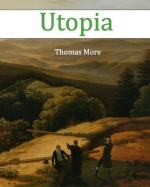“They think the contemplating God in His works, and the adoring Him for them, is a very acceptable piece of worship to Him.
“There are many among them that upon a motive of religion neglect learning, and apply themselves to no sort of study; nor do they allow themselves any leisure time, but are perpetually employed, believing that by the good things that a man does he secures to himself that happiness that comes after death. Some of these visit the sick; others mend highways, cleanse ditches, repair bridges, or dig turf, gravel, or stone. Others fell and cleave timber, and bring wood, corn, and other necessaries, on carts, into their towns; nor do these only serve the public, but they serve even private men, more than the slaves themselves do: for if there is anywhere a rough, hard, and sordid piece of work to be done, from which many are frightened by the labour and loathsomeness of it, if not the despair of accomplishing it, they cheerfully, and of their own accord, take that to their share; and by that means, as they ease others very much, so they afflict themselves, and spend their whole life in hard labour: and yet they do not value themselves upon this, nor lessen other people’s credit to raise their own; but by their stooping to such servile employments they are so far from being despised, that they are so much the more esteemed by the whole nation.
“Of these there are two sorts: some live unmarried and chaste, and abstain from eating any sort of flesh; and thus weaning themselves from all the pleasures of the present life, which they account hurtful, they pursue, even by the hardest and painfullest methods possible, that blessedness which they hope for hereafter; and the nearer they approach to it, they are the more cheerful and earnest in their endeavours after it. Another sort of them is less willing to put themselves to much toil, and therefore prefer a married state to a single one; and as they do not deny themselves the pleasure of it, so they think the begetting of children is a debt which they owe to human nature, and to their country; nor do they avoid any pleasure that does not hinder labour; and therefore eat flesh so much the more willingly, as they find that by this means they are the more able to work: the Utopians look upon these as the wiser sect, but they esteem the others as the most holy. They would indeed laugh at any man who, from the principles of reason, would prefer an unmarried state to a married, or a life of labour to an easy life: but they reverence and admire such as do it from the motives of religion. There is nothing in which they are more cautious than in giving their opinion positively concerning any sort of religion. The men that lead those severe lives are called in the language of their country Brutheskas, which answers to those we call Religious Orders.




